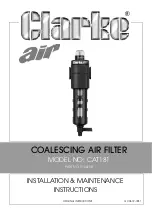
3
Parts & Service: 020 8988 7400 / E-mail: [email protected] or [email protected]
3. Keep children and visitors away - do not let children handle the air tools.
4. Do not operate air tools where there are flammable liquids or gases.
USE OF AIRLINE EQUIPMENT
1. Stay alert and use common sense - do not operate an air tool when you
are tired or under the influence of alcohol, drugs or medication.
2. Do not overreach when using air tools - Keep proper footing and balance
at all times.
3. Never use oxygen, carbon dioxide, combustible gases or any type of
bottled gas as a source of power for air tools.
4. Do not exceed the maximum pressure for the airline component stated in
the specification.
5. Check airline hoses for leaks or worn condition before use and ensure that
all connections are secure.
6. Keep the flexible air supply hose away from heat, oil and sharp edges.
7. Avoid damaging the components for example by applying excessive force
of any kind.
8. Always maintain any air tool to be used with care. Keep it clean for the
best and safest performance.
COMPRESSED AIRLINE REQUIREMENTS
• Use only clean, dry, regulated compressed air as a power source.
• Air compressors must comply with the appropriate European
Community Safety Directives.
• A build-up of moisture in the air compressor will accelerate wear
and corrosion in the air tool. Ensure any moisture is drained from the
compressor daily and the airline filter is kept clean.
• If an unusually long air hose is required, (over 8 metres), the line
pressure or the hose inside diameter may need to be increased.
• The air hose must be rated at least 150% of the maximum operating
pressure of the air tool.
WARNING: COMPRESSED AIR CAN BE DANGEROUS. ENSURE THAT YOU
ARE FAMILIAR WITH ALL PRECAUTIONS RELATING TO THE USE OF
COMPRESSORS AND A COMPRESSED AIR SUPPLY.
Summary of Contents for CAT181
Page 8: ......








